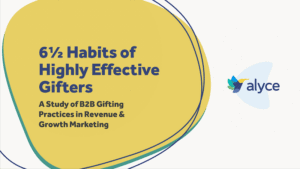
In September we hosted our annual virtual event YOUniverse with a breakout session of privacy pros who shared how marketing can work with privacy teams to ensure they are on the right side of modern-day data laws. Our legal experts explained how marketers can continue to innovate, even when privacy laws make data use more complex.
Andy Dale, Alyce’s General Counsel, got to host an amazing panel which included:
- Kathleen Patton, General Counsel at CarGurus
- Andrea Migdal, General Counsel at 6sense, and
- Pedro Pavon, Global Policy Director, Monetization Privacy and Fairness at Facebook
Navigating legal complexities
Having worked at several companies as in-house counsel, Kathleen Patton believes that her conversations with marketing teams have changed significantly.
Instead of questions about press releases and brand campaigns, today’s conversations are more business critical. With more access to consumer data than ever before, “marketing can do some cool things, but it’s not free reign anymore,” she says. Instead of answering one off questions about the legality of marketing campaigns, legal teams are now also tasked with helping grow the business through clear legal guidelines and procedures.
California legislation and GDPR resulted in “the apex of the change in the relationship between legal and marketing teams,” explains Andrea Migdal. In-house counsel needs a strong relationship with the Chief Marketing officer as well as every marketer in the organization.
Creating the future of digital privacy law
Facebook has a lot of responsibility as one of the companies in a position to “help create advertiser rules and build frameworks and philosophies,” explains Pedro. Close alignment between marketing and legal teams is crucial when developing innovative guidelines.
In fact, smaller companies look to big players like Google and Facebook for guidance on how to structure their own data policies. Pedro recommends joining resource groups and bouncing concepts off of other legal professionals from different companies. “This is a chance to see what folks who aren’t drinking the company kool aid find important right now,” he says. An example is how companies handle opt-out requirements. “Consumers want to know that their data is treated the same way by all companies,” adds Kathleen.
Ultimately, these legal concepts come down to explainability, transparency, and fairness which Pedro says are coming under increased regulatory scrutiny. As we move into the next stage of automated marketing, these regulations must be built into the foundational design.
One of the biggest challenges that data marketers are going to face in the future is the creation of a centralized opt-in bureau.This would be a place where consumers can dictate how their personal information is used by any company. Consumers can say yes to marketing content about sneakers, for example, and no to content about hair products. Automated marketing will need to adapt to this new landscape.
Want to learn more?
Check out the rest of the best practices for gifting including gift ideas and tips to deliver memorable experiences throughout the customer journey.






